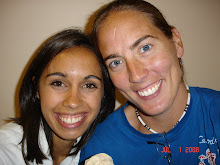One thing we did as we went out visiting Tabitha villages was to talk to a few people living in communities that had had no contact with Tabitha and in some cases no contact with any NGOs at all. The families we met were very poor, and it was obvious as we talked to them that some major differences existed be tween them and the people participating in the Tabitha programs. It is hard to tell at this point if those differences emerged because of their participation in the program or if the differences influenced their decision and opportunities to participate in them. Nevertheless, some striking and heart-breaking things became clear to us.
tween them and the people participating in the Tabitha programs. It is hard to tell at this point if those differences emerged because of their participation in the program or if the differences influenced their decision and opportunities to participate in them. Nevertheless, some striking and heart-breaking things became clear to us.
The pain and constant struggle that represents their life is obvious when you talk to them, and the exhaustion of living just exudes from them. They have no plans for the future. They can't really see beyond food today and finding work tomorrow. It was so sad to ask them questions about what they hope for in the future or what they worry about for their children, and observe their inability to see beyond food and shelter. Those are the obvious concerns and they loom so large that anything else is eclipsed. No wonder they have such difficulty  making changes...they don't have time or energy to even think about change let alone start moving toward it. The people participating with Tabitha in the saving program seem to have begun to see a little sliver of hope shining through the door of possibility that is just barely starting to open for them, with the help of people who genuinely care. What a gift these representatives are giving people. They are helping them open their eyes to what could be. I take that ability for granted. We are so fortunate; we get to think about goals and possibilities and relationships. We can even think about thinking! I can't imagine strugglin
making changes...they don't have time or energy to even think about change let alone start moving toward it. The people participating with Tabitha in the saving program seem to have begun to see a little sliver of hope shining through the door of possibility that is just barely starting to open for them, with the help of people who genuinely care. What a gift these representatives are giving people. They are helping them open their eyes to what could be. I take that ability for granted. We are so fortunate; we get to think about goals and possibilities and relationships. We can even think about thinking! I can't imagine strugglin g the ways these people do. I feel so helpless and unfairly privileged, and I realized that in many ways I have done nothing to merit those privileges. Talking to these families has really helped me see life from a different perspective.
g the ways these people do. I feel so helpless and unfairly privileged, and I realized that in many ways I have done nothing to merit those privileges. Talking to these families has really helped me see life from a different perspective.





No comments:
Post a Comment